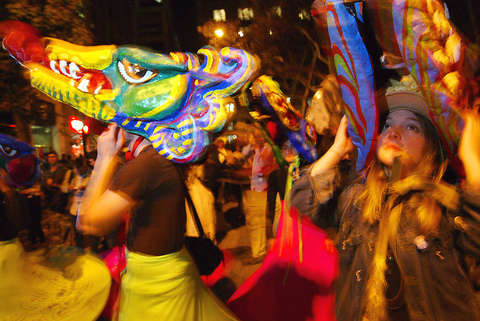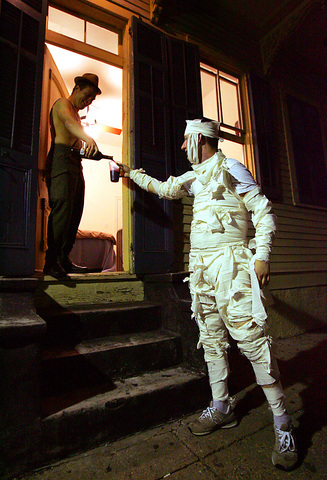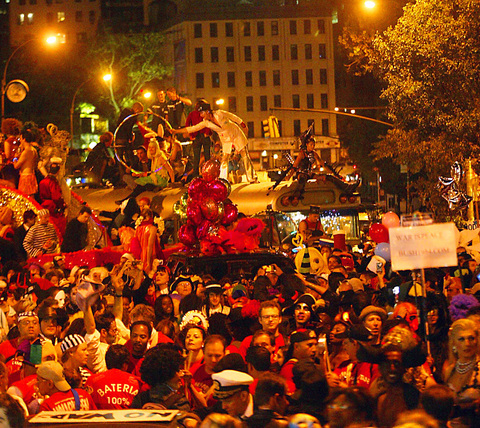For more than two months, Dave Weiss has been painstakingly planning the details of his Halloween celebration. Last year, he and his wife, Katie Harrigan, carved pumpkins and
labored for several hours in their Hoboken, New Jersey, apartment to make a chicken pie with sherry shallot jus gravy. They bought Smuttynose Pumpkin Ale, baked ghost-shape cookies and savored their favorite sweet, the dark chocolate pumpkin from La Maison du Chocolat. But the pumpkin has competition this year.
Weiss, a 32-year-old photo transmissions manager, is tempted by the spiced pumpkin-shaped cake at Dean and Deluca.

"I buy the chocolates every year," he said, "but this cake just looks so good."
The couple are as hooked on Halloween as any
8-year-olds.

PHOTO: NY TIMES NEWS SERVICEN
"As I'm getting older, I find Halloween becoming my favorite holiday," Weiss said. "It's the perfect time for a foodie like me."
According to retailers, Halloween now has a distinctly adult mood. Anna Baxter Kirk, a spokeswoman for the online costume store BuyCostumes.com, said the sales for adult Halloween costumes are slated to overtake those of children's for the first time this year. But for adults, Halloween is also about fancy candy, sophisticated food and drink, and perhaps above all, having an excuse to indulge.
Cress Templeton, 46, a lawyer from Bel Air, California, said many of his neighbors hold open houses on Halloween.

PHOTO: NY TIMES NEWS SERVICE
"People buy cases of good wine and get platters of appetizers. Last year, my wife and I bought sushi rolls and salmon tarts," Templeton said. "The adults go from house to house drinking and eating away."
Chandrika Tandon, a 50-year-old businesswoman who lives on the Upper East Side of Manhattan, said she looks forward to her building's Halloween open house.
Last year, she said, "there was a lot of food from Eli's Vinegar Factory like shrimp cocktail and cheese pies."
Stacy Hoffman, a 35-year-old giftware company owner in Manhattan, said Halloween was increasingly becoming an occasion like New Year's Eve, when adults feel they can drink a little more than usual. "The funky cocktails only add to the festive spirit," she said.
"Baby boomers are driving the adultification of
Halloween," said Susan Fussel, spokeswoman for the National Confectioners Association. "Trick-or-treating didn't really take off and become big until the baby boomer generation," she said.
Candy sales account for US$2 billion of the US$3 billion Halloween industry, Fussel said. There are no specific figures on upscale candy, which she said makes up more and more of overall sales.
Retailers have been quick to try to satisfy customers' craving. La Maison du Chocolat, based in Paris, started catering to the Halloween market five years ago at the request of US customers, said Nora Hovanesian-Mann, who manages the Madison Avenue branch.
"Since Halloween is not celebrated in France, we created products for our American customers and were stunned by how well they were received," she said. A top-selling item is the US$50 chocolate pumpkin filled with caramelized roasted almonds, Weiss' usual splurge.
At Neiman Marcus, Halloween is the second biggest holiday for sales, trailing only Christmas, said Diane Somers, a merchandise manager. Its Halloween items include a US$70 box of 18 Eleni's cookies shaped like bats and ghosts.
Some adults prefer candy that reminds them of childhood. Jerry Cohen, the owner of Economy Candy on Manhattan's Lower East Side, said that in the last five years he has had to order more of the candy he ate while growing up in the 1950s and 1960s.
"The Wack-o-Wax Lips, the Mary Janes," he said. "These adults want all the candy from when they were young."
Nostalgic candy holds less interest for Dave Weiss. He is deliberating over the chocolate pumpkin and the spiced cake.
"We've already bought our pumpkin beer, but I'm not sure what the rest of the menu is yet," he says. "I do know that it will be a memorable meal."

Towering high above Taiwan’s capital city at 508 meters, Taipei 101 dominates the skyline. The earthquake-proof skyscraper of steel and glass has captured the imagination of professional rock climber Alex Honnold for more than a decade. Tomorrow morning, he will climb it in his signature free solo style — without ropes or protective equipment. And Netflix will broadcast it — live. The event’s announcement has drawn both excitement and trepidation, as well as some concerns over the ethical implications of attempting such a high-risk endeavor on live broadcast. Many have questioned Honnold’s desire to continues his free-solo climbs now that he’s a

As Taiwan’s second most populous city, Taichung looms large in the electoral map. Taiwanese political commentators describe it — along with neighboring Changhua County — as Taiwan’s “swing states” (搖擺州), which is a curious direct borrowing from American election terminology. In the early post-Martial Law era, Taichung was referred to as a “desert of democracy” because while the Democratic Progressive Party (DPP) was winning elections in the north and south, Taichung remained staunchly loyal to the Chinese Nationalist Party (KMT). That changed over time, but in both Changhua and Taichung, the DPP still suffers from a “one-term curse,” with the

Jan. 26 to Feb. 1 Nearly 90 years after it was last recorded, the Basay language was taught in a classroom for the first time in September last year. Over the following three months, students learned its sounds along with the customs and folktales of the Ketagalan people, who once spoke it across northern Taiwan. Although each Ketagalan settlement had its own language, Basay functioned as a common trade language. By the late 19th century, it had largely fallen out of daily use as speakers shifted to Hoklo (commonly known as Taiwanese), surviving only in fragments remembered by the elderly. In

Lines between cop and criminal get murky in Joe Carnahan’s The Rip, a crime thriller set across one foggy Miami night, starring Matt Damon and Ben Affleck. Damon and Affleck, of course, are so closely associated with Boston — most recently they produced the 2024 heist movie The Instigators there — that a detour to South Florida puts them, a little awkwardly, in an entirely different movie landscape. This is Miami Vice territory or Elmore Leonard Land, not Southie or The Town. In The Rip, they play Miami narcotics officers who come upon a cartel stash house that Lt. Dane Dumars (Damon)